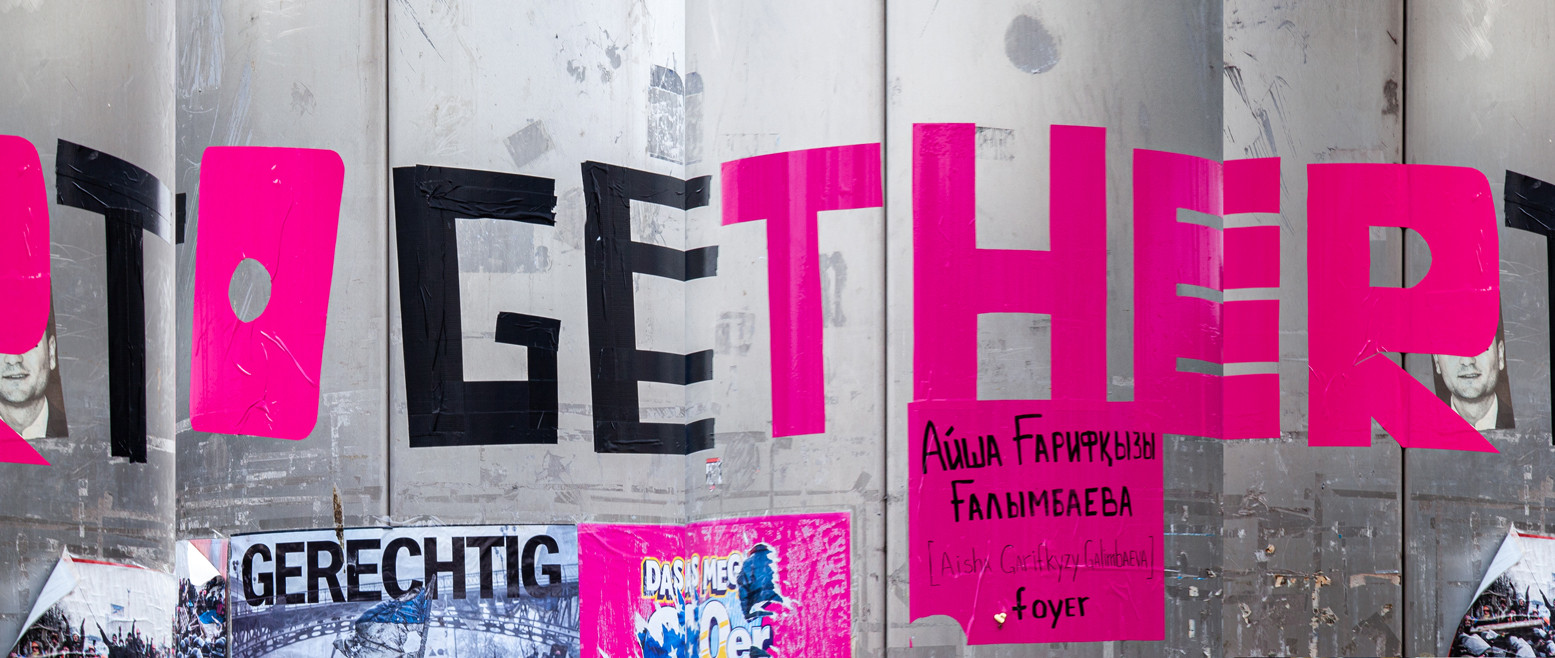The Otherness. They are always speaking. Who listens?
We were born in a poor time
never touching
each other’s hunger
never
sharing our crusts
in fear
the bread became enemy.
― Audre Lorde
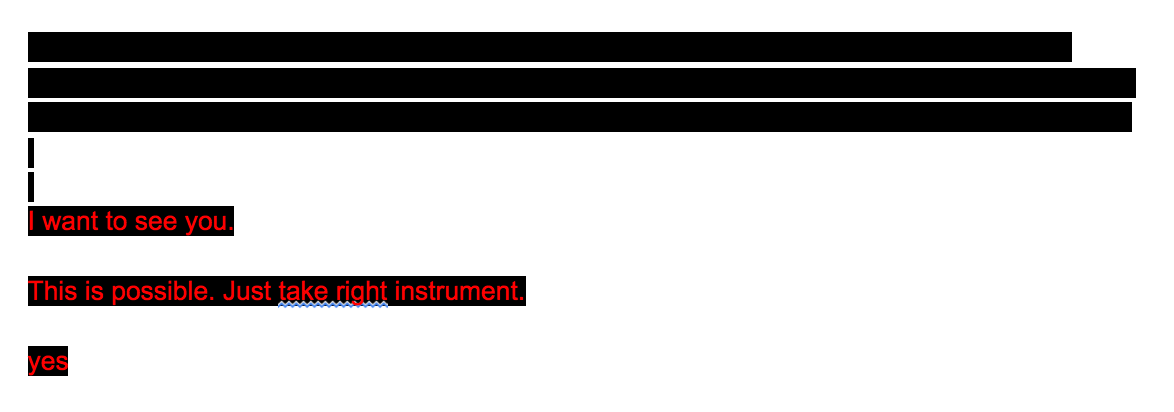
- Northern Landscapes
- Production of a Hole
- Production of the Distance
- Invisibility Trick
- The Others are a Speaking Void
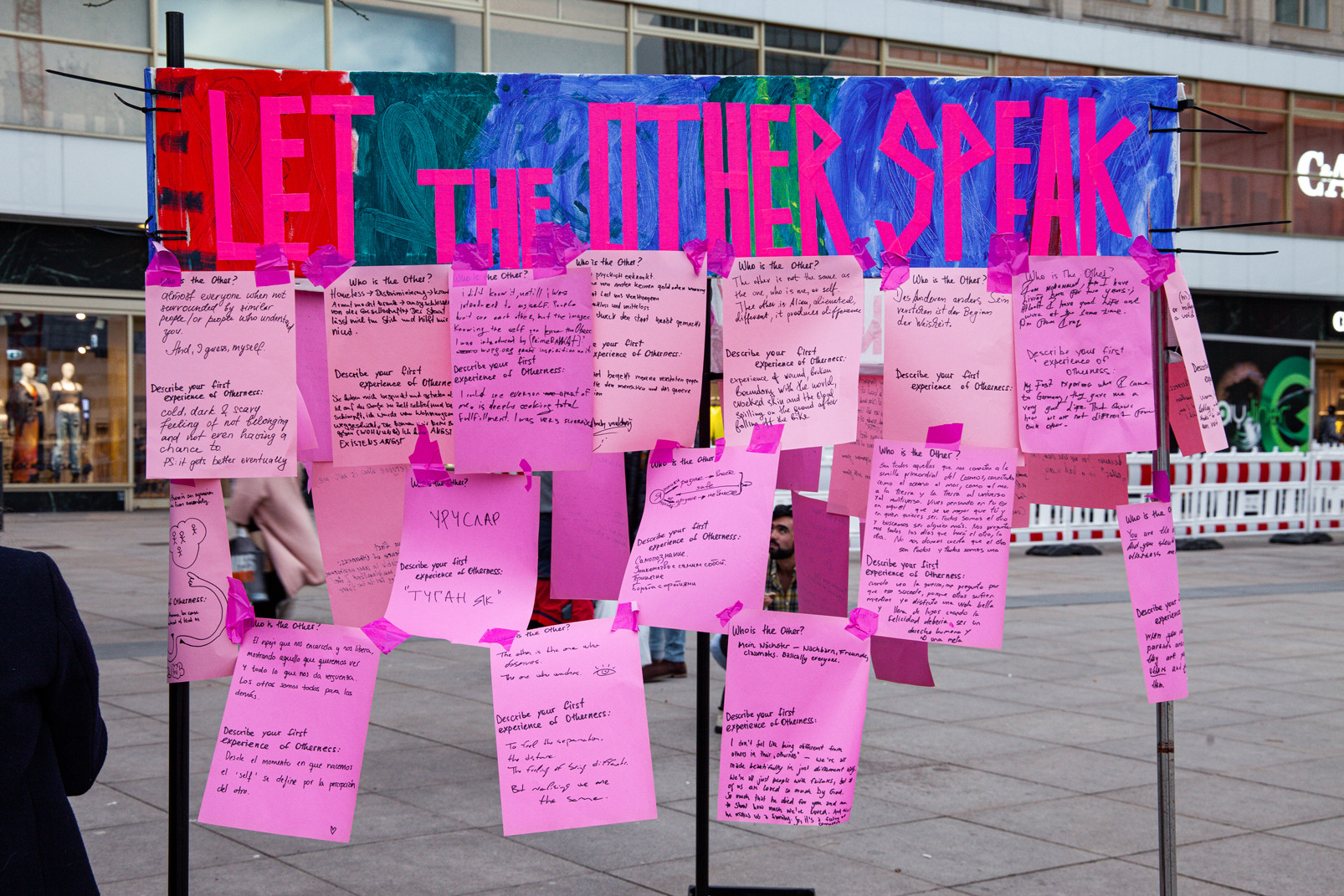
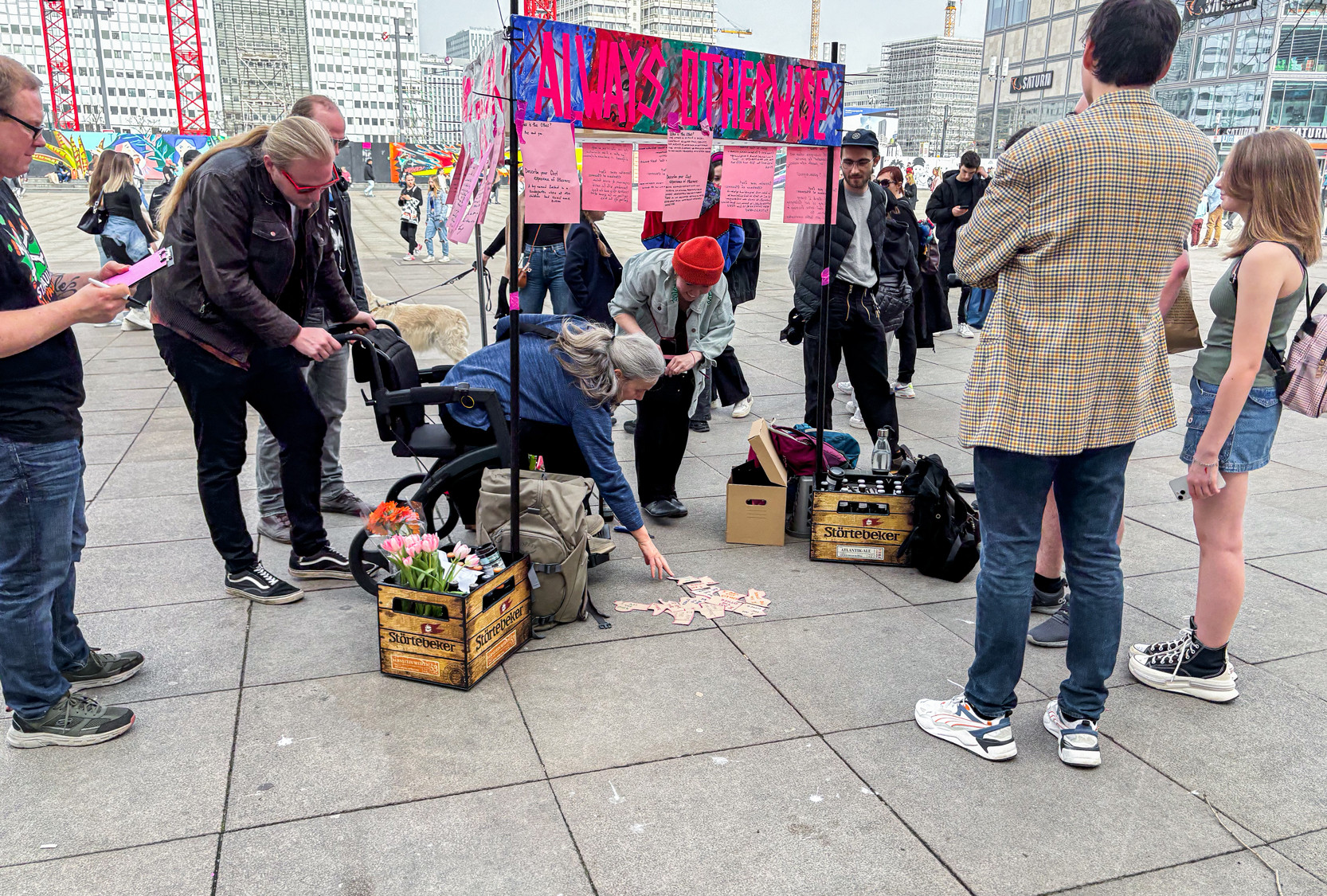
Northern Landscapes
Can the Others exist? Contemporary political elites in national states inform us that NO. Others cannot exist. And we live in a world where there hasn’t been a day without war. Political leaders, as if chosen or as if given, commit military and police forces to enforce everybody to their knowledge and their wills for power and their lust for capital. The base of European policies is protectionism. Others are destroyed, packaged, demonized, stacked on shelves of categories and in mass graves, given anti-humanist labels. Josep Borrell wants to save the "European garden" and to be a gardener in the "east", "south", "wild" places invented by Western epistemicides. He wants to cultivate the Other. In what language is it possible to conceptualize such a contemporaneity?
if the story of packed black people
stacked in the cargo holds of ships
is true and the narration lacks empathy
The Atlantic is a graveyard for Glissant
the bones — Os — there are not in wood, not in shrouds, but in metal
silent metal like the muted mouths open
in Kadishman’s tinkling fallen leaves
no questions
if the story of the concentration camps can be the setting
for a love drama or a land seizure
and the thorny walls of such architecture
are the backdrop for a safe dancing
far away from guards checking pockets and pupils
and these landscapes are comparable in linear meters
with goethe’s oak and the Beech Forest in which suum cuique
no empathy
no questions
no empathy, no questions
to the neighbor to Self to the Other
then the relations function as
biological minus social
multiplied by the hierarchies of the ancient Greeks
through which it’s normalized
Imagine the Arabs didn’t preserve those Greeks
to the European barbarians
what kind of dominance narrative
the northerners would use to reconcile themselves with their landscapes
At the end of March 2024, the de_colonialanguage collective held a "Can the Other Speak" action at the Open Air Museum of Decoloniality in Berlin. Visitors were invited to share who the Others are. They filled in sheets with words and drawings. The answers ranged from "The Other is me" to "The state is destroying us on purpose."
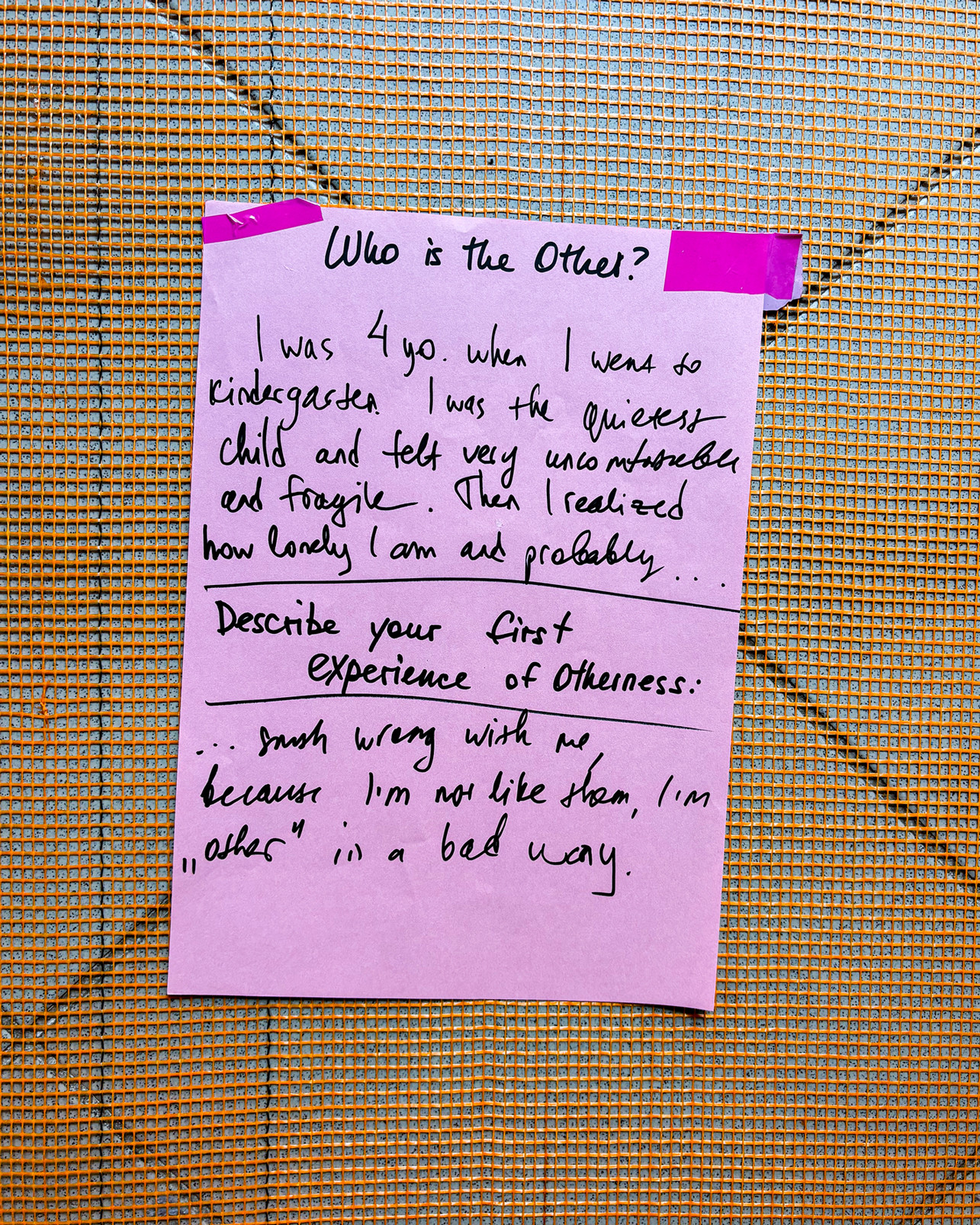
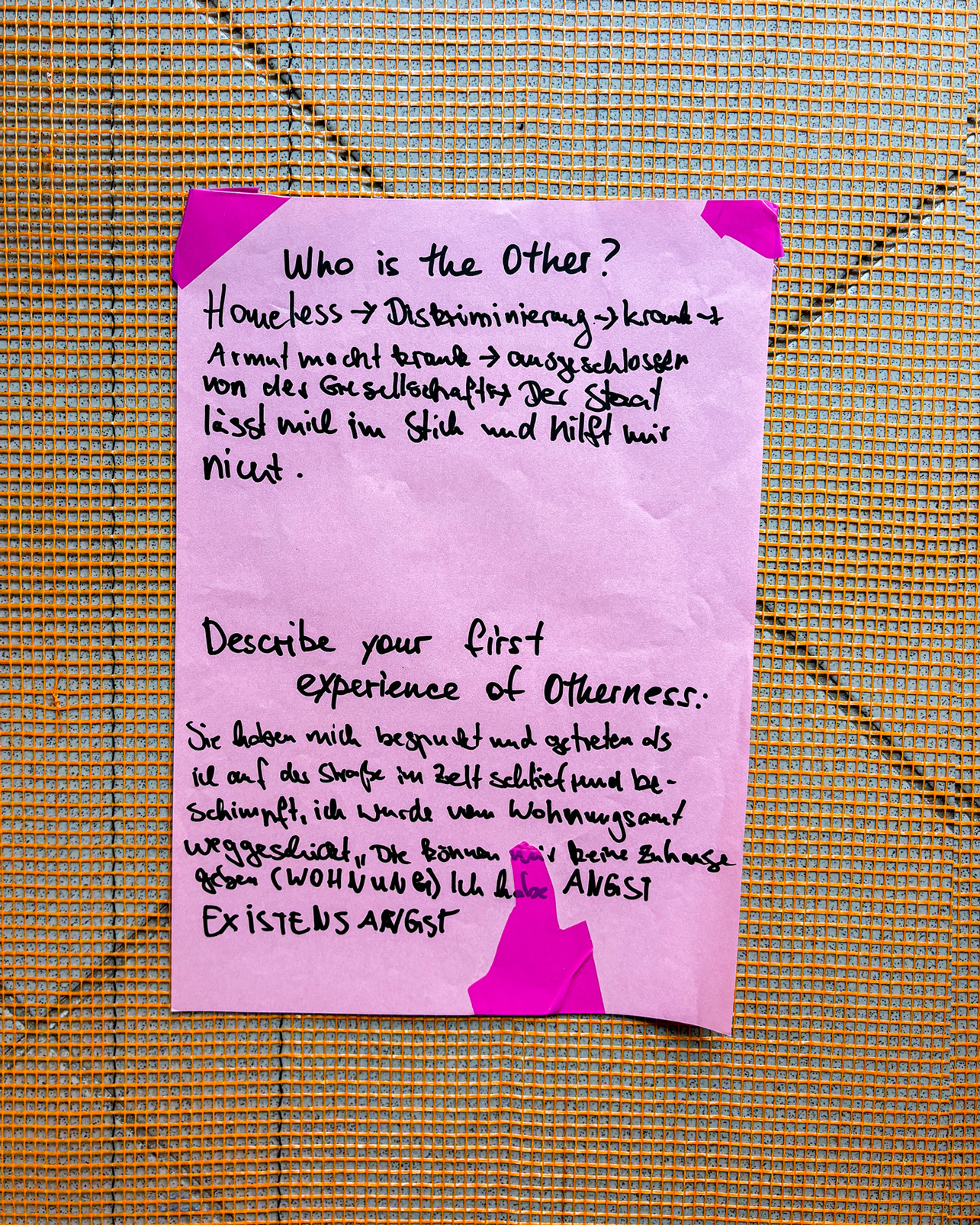
I want to highlight this difference, this distance. The Others as the responsible choice of the modern therapeutically conscious person. And the Others as a systemic lack of choice, a desire to escape from the cage of limitations and deprivation. Nearby words — racism, xenophobia, migrantophobia, eurocentrism, islamophobia, misogyny, militarism.
And let us make this difference binary sharp, painful:
In Western mindset, the Other is an imaginary container in which you can put many things, it is a way to meet your desire in the case of Lacan, it is a space for development, tolerance, mutual understanding. It is a space of imagination and conscious orientation towards each other.
In colonized cultures, it is a daily practice. The practice of oppression, including invisible oppression. The practice of limitation and punishment. It is the desire to be not oneself, but to be more like the dominant Others. The rejection of the Self, of the ego, because it is too difficult, painful and risky.
Right now, migrant workers from Central Asia and non-Russian, non-Russian-looking Russian citizens are being targeted on the basis of xenophobic fears and hatred. The Russian state caused this and the state is sponsoring it. Being Other is painful and this being is not a privilege of choice. Read here a letter of appeal from the Others of Russia calling for an end to xenophobic violence.
Paul B. Preciado, a trans-person, one who realized his Otherness and decided that one of the ways to overcome the patriarchal-colonial system in which we live is to manifest his Otherness through the body. His experience, his body, the other epistemologies he creates are his manifesto. He made an interesting observation in his speech "Can the Monster Speak?" — widely discussed by Western institutions and researchers, questions of identity exist within the same patriarchal-colonial system. Only oppressed Others — subulterns, those who are not equal to the dominant Others, are confronted with questions of identity. The identities of the dominant Others are violently invisible and seemingly do not need to be researched or voiced. And these violent dominant invisibilities claim to be universal not only in their northern landscapes, but everywhere, these invisibles plan to "colonize Mars".
what I know for sure is this: there are always other words and other definitions, always other worlds and other locations. To know this is to see this, too: we can grow the spines we need to stand up for our lives.
― Eloghosa Osunde, & Other Stories
Production of a Hole
Following Preciado’s thought on the forcing to question oneself about identity (as a migrant, as a trans person, as a woman, as oppressed, as a child), I want to understand how this mechanism works. I see it as coercion with a sense of necessity. Where does the sense of necessity come from?
The dominant Others pose the question "What does a woman want?", and they also bring Fanon, in his analysis of his situation of oppression, to the question "What does a black man want?". Biopolitics, the politics of capital, and racism organize a space of psychological inferiority, a space of void within the oppressed Other. They organize holes in the Other. Pascal considered a kind of natural hole and filled it with a god; Sartre argues with him, claiming that the hole is artificial. Fanon inhabited an artificial hole organized in him by the dominant Other. The sense of the hole as something missing, gaping, incomplete, erased. The person in search of identity is Fanon’s person with a hole. These are not just ‘holes’ in individual personalities, they are ‘gargantuan cavities’ (Ndikung) in entire societies.
Power relations have developed in such a way that the hole gapes and seriously affects the psychological landscape.
At the same time, the dominant Others who organize holes in living people and whole communities are quite capable of constructing their own image as good "gardeners". On the one hand their actions cause holes in others, and on the other hand they bring "civilization," "progress," "enlightenment," and their gods. They make holes in Others and don’t tolerate discussion of it, the institutions built around it will create theories to explain such violence as a good thing. This is the history of racism, first there were genocides, wiping out populations of entire islands, and then the academy brought in racial theory normalizing this horror through social-Darwinism and other pseudo-theories.
Still others will say that it was the secret desires of my parents (invariably imaged as a binary heterosexual, preferably white couple) that surfaced in me and made me what I am today. Bullshit. These are no more than grotesque simplifications. I am not at all what you imagine.
― Paul B. Preciado
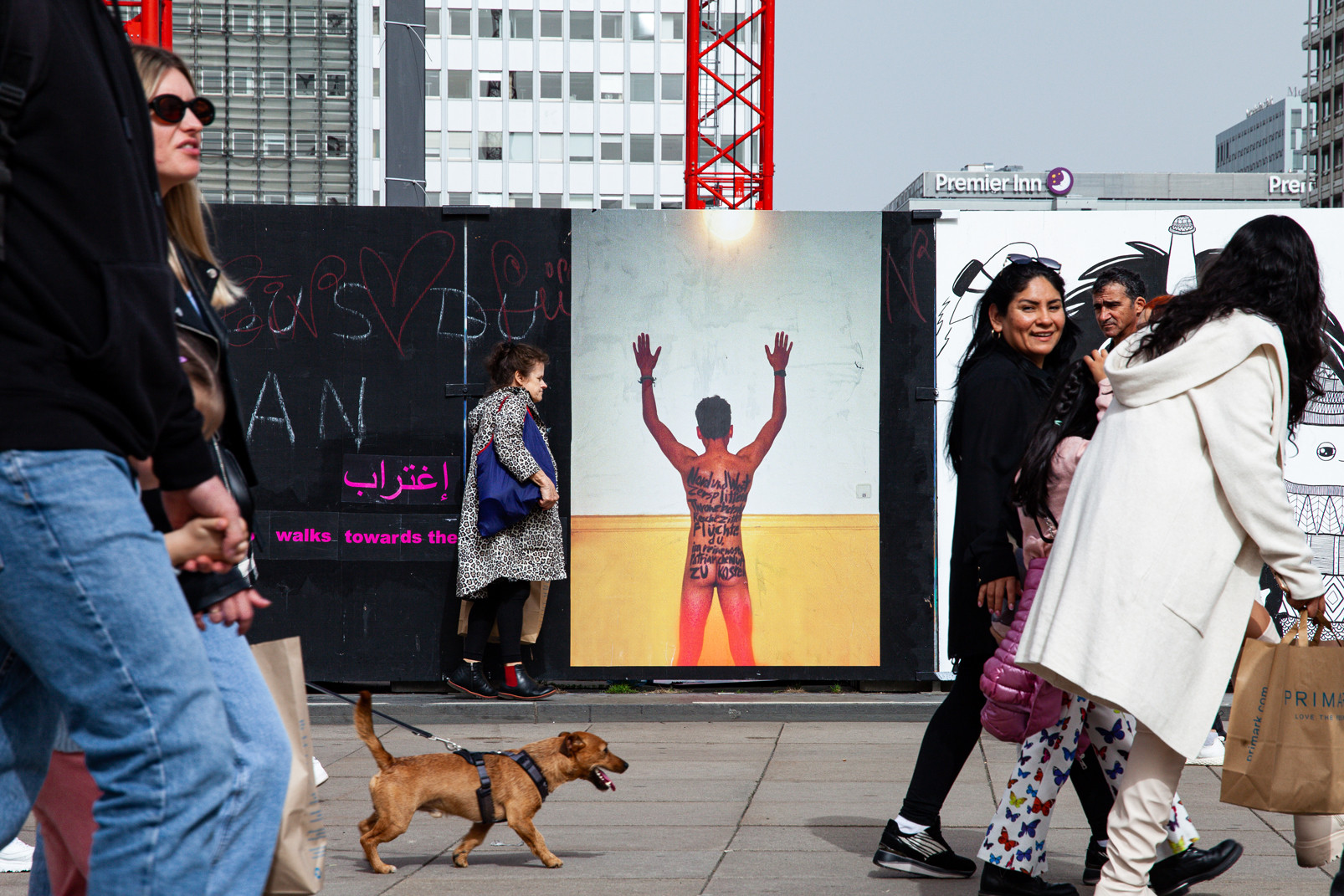
part of the piece "The Path of the Sun or the Bare Life" by Mohamed-Ali Ltaief in Open Air Museum of Decoloniality
Production of the Distance
Another tool for the production of oppressed Others. The invention of perspective led to the increasing role of abstraction in society. Other abstractions already existed — time, counting, and writing were already great abstractions. Perspective, on the other hand, injected abstraction into relations. It changed the images of the future and of the invisible lands. The visible at a distance has no agency, no emotion, no body. Nothing. Visibility at a distance is quickly assessed without detailing those images. The dot on the horizon cannot be compared to me or to those around me. It is an image that can delight, be exotic, be dangerous, and be cute. But not equal to me, the observer. One who is armed with perspective. To "understand the Other one needs fun,” wrote georgian philosopher Merab Mamardashvili. One has to laugh together, and this is possible when the Other is near. Sharing emotions is possible only with those who are spatially close. Emotions are reduced in all other mediums to peaks of extremes or to indistinguishable neutrality. Emotions outside the body, on the screen, are not emotions, but their representation. Their transformation through rational capitalist relations. Perspective is the weapon of rationality and mechanization. And one who uses it lubricates the relations machine with epistemicide oil. For perspective to do its work, a gigantic machine of Knowledge has to work, rejecting other ways of cognizing the world, introducing a bureaucracy of "correct" archives.
If the encounter had taken place in the jungle, each would have been breathing on the back of the neck of those stepping on their heels, everyone in front of someone else’s nose. Tree trunks, branches, vines, bodies and foliage. All on every side. And each one only sees the other little by little, half-covered, half-hidden, and only when it is very late and they are very near, when breathing the same air, warmed by the other’s lungs. If the meeting had been in the jungle, history would have been different.
― Carla Zaccagnini
With what tools, with what archive do I encounter some-one-thing unknown to me or challenging my points of view? An optic with a perspective apparatus lines up time, the Future appears on the horizon — a collection of my hopes and expectations — this is the main scene of the Human-being-with-Perspective’s action. This desire is so strong that the life of Tomorrow becomes more important than the life of Today. It is a different perception of conflict. The conflict of Today is an obstacle to my fantasy of Tomorrow. If I live Today and my nonlinear time has no Tomorrow, then the conflict of Now is the space of action. It becomes an encounter in the jungle. It is not to be waited on or ignored. It is to be lived through and to find different points of interaction.
Accepting (not understanding) the opposing point of view, accepting the possibility of multiple realities, is what the optics of non-Perspective allows.
And this optics allows us to be open to different realities, perceptions, values. It is a space in which action and communion are more important than the strategic rejection of the Other, because it is not present in the fantasy of the Future. The Other is sudden and unpredictable and therefore a threat to the detailed fantasy of the Future.
The invention of perspective brought distance into human relations, leading us all to invisibility. The invisibility of violence, the invisibility of the Other, the invisibility of relations of power and capital.
Invisibility Trick
Researcher Sven Lindqvist describes Herbert Wells’s Invisible Man as an image and method of white violence against people of another culture and nature. This man is invisible literally, because he is hidden behind the perspective, his body absent from the scene of his aggressive actions. Importantly, he is also invisible to himself. He is farsighted. His body is an obstacle to action at the other end of the perspective tube. The invisible man has abandoned his body, tempering it with the tools of control. And if the body refuses order, it is declared diseased. This is what happened to the woman’s body, sick with mysterious hysteria. A body that does not obey, that manifests itself in the zone of visibility, must be punished. Because in the future the limitations of the body will be discarded.
The invisible, untouchable, insensible human being is a container for ideology, lust for possession, aggression and excuses.
The human being is open to the future and unconstrained by anything in the present time, except the call of the courier for the delivery of a box from Amazon, which is not a forest anymore, but one more abstraction. The space of perspective becomes the space of control and wish fulfillment of those who have occupied the point of best view and have accumulated the resources to defend that position in the power pyramid — knowledge, capital, propaganda. The actors of violence and oppression of the Other becomes invisible, replaced by façades of beautiful epistemes and their actions covered by talk of care (delusions of care). This is, for example, the nature of Soviet colonialism with its Marxist facade.
How to carry the "I" of the "we" without betraying one perception of the other
― Mahmoud Darwish
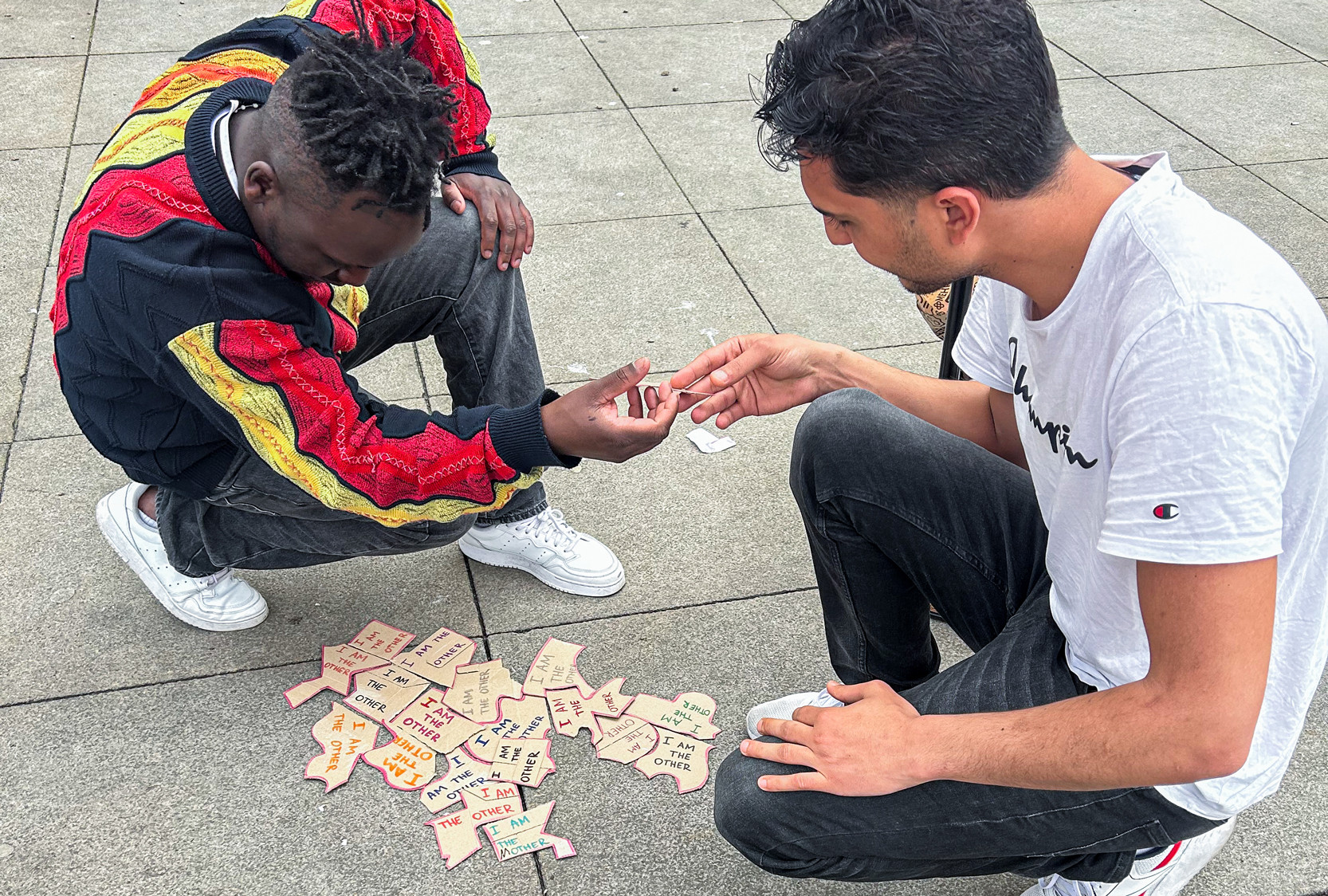
The Others are a Speaking Void
The Christian creators of medieval T-O maps did not know much about the world. They filled the unknown spots of space with biblical stories and monsters, a network of existing knowledge and myths. My friend Grisha jokingly gave the name of the unfilled places by the knowledge that are filled with imagination — fobs.
Fobs are unknown spaces filled with negative images and frightened fantasy instead of knowledge.
It would seem to be a non-existent word. I googled it. There is a magazine with that name — FOBS — the Fencing OBServer. Their website has the following description: FOBS Magazine is an international trade magazine about fences, gates, drives, access control and other perimeter protection devices and systems. I think this is a good title for the relations with the Unknownness established during the production of T-O maps — control and protection against the free interpretation of unmarked space. Forced filling with existing knowledge, colonization, instead of meeting the Unknownness and engaging in dialogue. I assume that the presence of fobs filled with scholarly cartographers with monsters was an important part of colonization. Colonizers were not traveling into the Unknownness, but into the mythical space of monsters to become "heroes" and conquerors. Fixed archives fill the space with monuments to themselves. Preset knowledge, the habit of granting one’s sense of security by expanding grids, leaves no room for the Other. The Other is already pre-described, endowed with special characteristics. Any its manifestation is read as confirmation of the previously established theory. Those who went into the Unknownness to conquer monsters will find them.
The rastaman thinks, draw me a map of what you see
then I will draw a map of what you never see
and guess me whose map will be bigger than whose?
Guess me whose map will tell the larger truth?
― Kei Miller, The Cartographer Tries to Map a Way to Zion
“Save Vizion from demons," Wataru Mitani wishes, a character in the anime Brave Story by Koichi Chigira. He asks the Goddess of Destiny to rid the world of his fictions and fantasies (Visión) of the demons that he himself inhabited. And from here on, he can assemble his own destiny. His greatest danger is the demons he himself invented. I had to invent fobs to keep the word "void" unmarked by the desire to conquer or appropriate. A void is a place for the Other. And an encounter with the void is a space without perspective into which the Other is already inhabited and the Other has a name to be heard, not given.
The established system of relations allows one not to listen to the Other or to oneself. Sven Lindqvist noted this in the paradox of fascism. The theorists called colonization the system of attitudes of Europeans toward other peoples and did not notice how this system affected them. When the fascist and Nazi regimes began to destroy people in the center of Europe, it was a consequence of the defeat of the culture and relational system by the mechanics of colonization. Colonization as a system of relations has long been affecting not only the indigenous peoples of non-European lands but above all the established pattern is affecting the relations of Europeans themselves with each other, replacing ties within the community with consumerist compensation and the development of unacceptable images of Others and as a consequence an aggressive policy of security and defense of themselves and their domains. Territory looks more and more like a fobs, a space enclosed by fences in which Others are placed for temporary stays or for their transformation into acceptable integrated geometrically right people.
Are the Others still monsters from medieval maps?
"respect the mountain"
treat the land as your equal
the holes of the ruined Amazon
the bare tree trunks of broken teeth around the edges
speaks
speak about disrespect
disrespect that has the power of fire
disrespect
of other’s body, of other’s sensation
disrespect as LSD for one’s ego
they, she, it always speaks
the one who is "right" loves silence
even if there is no silence
as well as the truth doesn’t exist
they always speak
